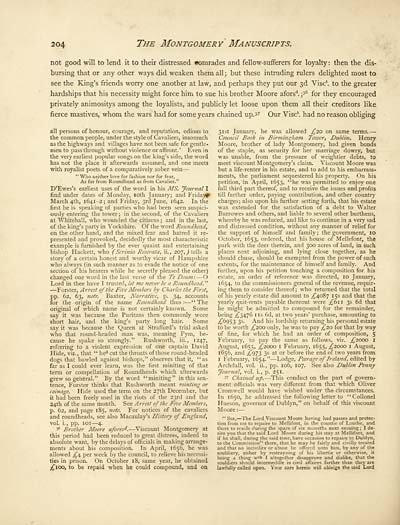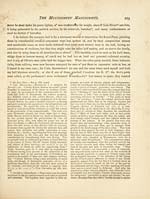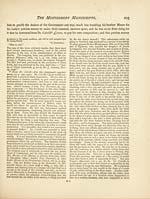Montgomery manuscripts
(218) Page 204
Download files
Complete book:
Individual page:
Thumbnail gallery: Grid view | List view

204
The Montgomery Manuscripts,
not good will to lend it to their distressed eomrades and fellow-sufferers for loyalty: then the dis-
bursing that or any other ways did weaken them all; but these intruding rulers delighted most to
see the King's friends worry one another at law, and perhaps they put our 3d Vise', to the greater
hardships that his necessity might force him to sue his brother Moore afors d .; 36 for they encouraged
privately animositys among the loyalists, and publicly let loose upon them all their creditors like
fierce mastives, whom the wars had for some years chained up.3? Our Vise', had no reason obliging
all persons of honour, courage, and reputation, odious to
the common people, under the style of Cavaliers, insomuch
as the highways and villages have not been safe for gentle-
men to pass through without violence or affront. ' Even in
the very earliest popular songs on the king's side, the word
has not the place it afterwards assumed, and one meets
with royalist poets of a comparatively sober vein —
"Who neither love for fashion nor for fear,
As far from Roundhead as from Cavalier."
D'Ewes's earliest uses of the word in his MS. yourual I
find under dates of Monday, 10th January; and Friday^
March 4th, 1641-2 ; and Friday, 3rd June, 1642. In the
first he is speaking of parties who had been seen suspici-
ously entering the tower ; in the second, of the Cavaliers
at Whitehall, who wounded the citizens ; and in the last,
of the king's party in Yorkshire. Of the word Roundhead,
on the other hand, and the mixed fear and hatred it re-
presented and provoked, decidedly the most characteristic
example is furnished by the ever quaint and entertaining
bishop Hackett, who (Scrinia Rcserala, ii. , 107,) tells a
story of a certain honest and worthy vicar of Hampshire
who always (in such manner as to evade the notice of one
section of his hearers while he secretly pleased the other)
changed one word in the last verse of the Te Drum: — O
Lord in thee have I trusted, let me never be a Roundhead."
— Forster, Arrest of the Five Members by Charles the First,
pp. 62, 63, note. Baxter, Narrative, p. 34, accounts
for the origin of the name Roundhead thus: — "The
original of which name is not certainly known. Some
say it was because the Puritans then commonly wore
short hair, and the king's party long hair. Some
say it was because the Queen at Strafford's trial asked
who that round-headed man was, meaning Pym, be-
cause he spake so strongly." Rushworth, Hi., 1247,
referring to a violent expression of one captain David
Hide, viz., that " he d cut the throats of those round-headed
dogs that bawled against bishops," observes that it, "as
far as I could ever learn, was the first miniting of that
term or compellation of Roundheads which afterwards
grew so general." By the word "miniting" in this sen-
tence, Forster thinks that Rushworth meant minting or
coinage. Hide used the term on the 27th December, but
it had been freely used in the riots of the 23rd and the
24th of the same month. See Arrest of the Five Members,
p. 62, and page 185, note. For notices of the cavaliers
and roundheads, see also Macaulay's History of England,
vol. i. , pp. IOI — 4.
3* Brother Moore afores d . — Viscount Montgomery at
this period had been reduced to great distress, indeed to
absolute want, by the delays of officials in making arrange-
ments about his composition. In April, 1656, he was
allowed £$ per week by the council, to relieve his necessi-
ties in prison. On October 18, same year, he obtained
,£100, to be repaid when he could compound, and on
31st January, he was allowed ^20 on same terms. —
Council Book in Birmingham Tower, Dublin. Henry
Moore, brother of lady Montgomery, had given bonds
of the staple, as security for her marriage dowry, but
was unable, from the pressure of weightier debts, to
meet viscount Montgomery's claim. Viscount Moore was
but a life-renter in his estate, and to add to his embarrass-
ments, the parliament sequestered his property. On his
petition, in April, 1653, "he was permitted to enjoy one
full third part thereof, and to receive the issues and profits
till further order, paying contribution, and other country
charges; also upon his further setting forth, that his estate
was extended for the satisfaction of a debt to Walter
Burrowes and others, and liable to several other burthens,
whereby he was reduced, and like to continue in a very sad
and distressed condition, without any manner of relief for
the support of himself and family ; the government, 10
October, 1653, ordered, that his house of Mellefont, the
park with the deer therein, and 300 acres of land, in such
places next adjoining, and lying close together, as he
should chuse, should be exempted from the power of such
extents, for the maintenance of himself and family. And
further, upon his petition touching a composition for his
estate, an order of reference was directed, 10 January,
1654, to the commissioners general of the revenue, requir-
ing them to consider thereof; who returned that the total
of his yearly estate did amount to ^4087 15s and that the
yearly quit-rents payable thereout were £611 3s 6d that
he might be admitted to compound for the remainder,
being .£3476 us 6d, at two years' purchase, amounting to
^6953 3s. And his lordship returning his personal estate
to be worth ,£200 only, he was to pay £20 for that by way
of fine, for which he had an order of composition, 5
February, to pay the same as follows, viz. ^2000 1
August, 1655, ^2000 I February, 1655,^2000 I August,
1656, and ^973 3s at or before the end of two years from
I February, 1654." — Lodge, Peerage of Ireland, edited by
Archdall, vol. ii., pp. 106, 107. See also Dublin Penny
yourual, vol. i., p. 251.
3? Chained up. — This conduct on the part of govern-
ment officials was very different from that which Oliver
Cromwell would have wished under the circumstances.
In 1650, he addressed the following letter to " Collonel
Hueson, governor of Dublyn, " on behalf of this viscount
Moore : —
" Sir, — The Lord Viscount Moore having had passes and protec-
tion from me to repaire to Mellifont, in the countie of Louthe, and
there to reside during the space of six moneths next ensuing; I de-
sire you that the said Lord Moore during his stay at Mellifont, and
if he shall, during the said time, have occasion to repaire to Dublyn,
to the Commission" there, that he may he fairly and civilly treated
and that no incivility or abuse be offered unto him, by any of the
souldiery, either by restrayning of his libertie or otherwise, it
being a thing wch I altogether disapprove and dislike, that the
souldiers should intermeddle in civil affaires farther than they are
lawfully called upon. Your care herein will obleige the said Lord
The Montgomery Manuscripts,
not good will to lend it to their distressed eomrades and fellow-sufferers for loyalty: then the dis-
bursing that or any other ways did weaken them all; but these intruding rulers delighted most to
see the King's friends worry one another at law, and perhaps they put our 3d Vise', to the greater
hardships that his necessity might force him to sue his brother Moore afors d .; 36 for they encouraged
privately animositys among the loyalists, and publicly let loose upon them all their creditors like
fierce mastives, whom the wars had for some years chained up.3? Our Vise', had no reason obliging
all persons of honour, courage, and reputation, odious to
the common people, under the style of Cavaliers, insomuch
as the highways and villages have not been safe for gentle-
men to pass through without violence or affront. ' Even in
the very earliest popular songs on the king's side, the word
has not the place it afterwards assumed, and one meets
with royalist poets of a comparatively sober vein —
"Who neither love for fashion nor for fear,
As far from Roundhead as from Cavalier."
D'Ewes's earliest uses of the word in his MS. yourual I
find under dates of Monday, 10th January; and Friday^
March 4th, 1641-2 ; and Friday, 3rd June, 1642. In the
first he is speaking of parties who had been seen suspici-
ously entering the tower ; in the second, of the Cavaliers
at Whitehall, who wounded the citizens ; and in the last,
of the king's party in Yorkshire. Of the word Roundhead,
on the other hand, and the mixed fear and hatred it re-
presented and provoked, decidedly the most characteristic
example is furnished by the ever quaint and entertaining
bishop Hackett, who (Scrinia Rcserala, ii. , 107,) tells a
story of a certain honest and worthy vicar of Hampshire
who always (in such manner as to evade the notice of one
section of his hearers while he secretly pleased the other)
changed one word in the last verse of the Te Drum: — O
Lord in thee have I trusted, let me never be a Roundhead."
— Forster, Arrest of the Five Members by Charles the First,
pp. 62, 63, note. Baxter, Narrative, p. 34, accounts
for the origin of the name Roundhead thus: — "The
original of which name is not certainly known. Some
say it was because the Puritans then commonly wore
short hair, and the king's party long hair. Some
say it was because the Queen at Strafford's trial asked
who that round-headed man was, meaning Pym, be-
cause he spake so strongly." Rushworth, Hi., 1247,
referring to a violent expression of one captain David
Hide, viz., that " he d cut the throats of those round-headed
dogs that bawled against bishops," observes that it, "as
far as I could ever learn, was the first miniting of that
term or compellation of Roundheads which afterwards
grew so general." By the word "miniting" in this sen-
tence, Forster thinks that Rushworth meant minting or
coinage. Hide used the term on the 27th December, but
it had been freely used in the riots of the 23rd and the
24th of the same month. See Arrest of the Five Members,
p. 62, and page 185, note. For notices of the cavaliers
and roundheads, see also Macaulay's History of England,
vol. i. , pp. IOI — 4.
3* Brother Moore afores d . — Viscount Montgomery at
this period had been reduced to great distress, indeed to
absolute want, by the delays of officials in making arrange-
ments about his composition. In April, 1656, he was
allowed £$ per week by the council, to relieve his necessi-
ties in prison. On October 18, same year, he obtained
,£100, to be repaid when he could compound, and on
31st January, he was allowed ^20 on same terms. —
Council Book in Birmingham Tower, Dublin. Henry
Moore, brother of lady Montgomery, had given bonds
of the staple, as security for her marriage dowry, but
was unable, from the pressure of weightier debts, to
meet viscount Montgomery's claim. Viscount Moore was
but a life-renter in his estate, and to add to his embarrass-
ments, the parliament sequestered his property. On his
petition, in April, 1653, "he was permitted to enjoy one
full third part thereof, and to receive the issues and profits
till further order, paying contribution, and other country
charges; also upon his further setting forth, that his estate
was extended for the satisfaction of a debt to Walter
Burrowes and others, and liable to several other burthens,
whereby he was reduced, and like to continue in a very sad
and distressed condition, without any manner of relief for
the support of himself and family ; the government, 10
October, 1653, ordered, that his house of Mellefont, the
park with the deer therein, and 300 acres of land, in such
places next adjoining, and lying close together, as he
should chuse, should be exempted from the power of such
extents, for the maintenance of himself and family. And
further, upon his petition touching a composition for his
estate, an order of reference was directed, 10 January,
1654, to the commissioners general of the revenue, requir-
ing them to consider thereof; who returned that the total
of his yearly estate did amount to ^4087 15s and that the
yearly quit-rents payable thereout were £611 3s 6d that
he might be admitted to compound for the remainder,
being .£3476 us 6d, at two years' purchase, amounting to
^6953 3s. And his lordship returning his personal estate
to be worth ,£200 only, he was to pay £20 for that by way
of fine, for which he had an order of composition, 5
February, to pay the same as follows, viz. ^2000 1
August, 1655, ^2000 I February, 1655,^2000 I August,
1656, and ^973 3s at or before the end of two years from
I February, 1654." — Lodge, Peerage of Ireland, edited by
Archdall, vol. ii., pp. 106, 107. See also Dublin Penny
yourual, vol. i., p. 251.
3? Chained up. — This conduct on the part of govern-
ment officials was very different from that which Oliver
Cromwell would have wished under the circumstances.
In 1650, he addressed the following letter to " Collonel
Hueson, governor of Dublyn, " on behalf of this viscount
Moore : —
" Sir, — The Lord Viscount Moore having had passes and protec-
tion from me to repaire to Mellifont, in the countie of Louthe, and
there to reside during the space of six moneths next ensuing; I de-
sire you that the said Lord Moore during his stay at Mellifont, and
if he shall, during the said time, have occasion to repaire to Dublyn,
to the Commission" there, that he may he fairly and civilly treated
and that no incivility or abuse be offered unto him, by any of the
souldiery, either by restrayning of his libertie or otherwise, it
being a thing wch I altogether disapprove and dislike, that the
souldiers should intermeddle in civil affaires farther than they are
lawfully called upon. Your care herein will obleige the said Lord
Set display mode to:
![]() Universal Viewer |
Universal Viewer | ![]() Mirador |
Large image | Transcription
Mirador |
Large image | Transcription
Images and transcriptions on this page, including medium image downloads, may be used under the Creative Commons Attribution 4.0 International Licence unless otherwise stated. ![]()
| Histories of Scottish families > Montgomery manuscripts > (218) Page 204 |
|---|
| Permanent URL | https://digital.nls.uk/95235543 |
|---|
| Description | A selection of almost 400 printed items relating to the history of Scottish families, mostly dating from the 19th and early 20th centuries. Includes memoirs, genealogies and clan histories, with a few produced by emigrant families. The earliest family history goes back to AD 916. |
|---|

